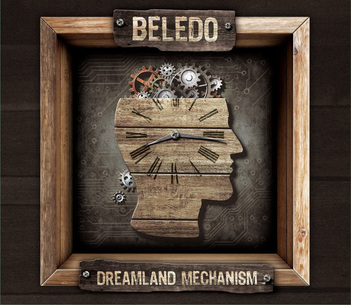
Dreamland Mechanism (MoonJune Records MJR077) is Beledo’s MoonJune debut and the stars have come out to shine on it. Joining Beledo is Gary Husband on drums, Dewa Budjana on guitars and Lincoln Goines on bass, and others of renown.
The album kicks off with Mechanism. The first instrument heard played by Beledo is the violin, followed by keyboards and electric guitar. He reminds one of Eddie Jobson. With him is Lincoln Goines (bass) and Gary Husband (drums). Gorgeous Progressive-Fusion is the flavor of the day on this one. Goines and Husband, of course, are monstrous.
Being the first time I ever heard Beledo, I was blown away by the talent of the Uruguayan multi-instrumentalist and any comparison to Jobson is a favorable one. His composing skills are formidable and his performing is virtuosic. I couldn’t decide where he was best: violin, guitars or keyboards.
Bye Bye Blues follows. It, like all the songs on the album, are composed by Beledo himself and produced by himself and Leonardo Pavkovic. Bye Bye Blues retains the same line-up as the opener. This is hard-driven Progressive-Blues. Beledo goes from electric guitar to Fender Rhodes and a mini-moog and finds the exact spot for the different voices. The guy dazzles, entertains and inspires. Plus, the two guys behind him enhance whatever may be going on.
Marilyn’s Escapade is inspired by the woman to whose memory the album is dedicated. It is the third track with the same trio. Beledo turns in beautiful acoustic piano work but also folds in the violin, accordion, electric guitar and keyboards. I had been forward to his guitar-playing but his piano talent is unmistakable. It was his first instrument, after all. When Beledo takes up the accordion, he creates a whole new atmosphere. The work of Goines and Husband is exciting stuff. Their rhythmic dialogue is so fine.
Beledo’s melodies are rich and memorable and this is unmistakably true on Marilyn’s Escapade.
The atmosphere changes, as does the line-up, on Lucila. Beledo is on Spanish guitar, fretless bass and electric guitar. With him are Endang Ramdan and Cucu Kurnia on Sundanese kendang percussion, both familiar to the MoonJune audience.
It seems that nothing is beyond the ken and craft of Beledo. Compositions and arrangements and an impressive array of mastered instruments are all part of his domain. His Spanish guitar proficiency offers a warmth and excitement that is not at all tempered by the Sundanese percussion.
Sudden Voyage has a reshuffled line-up with Beledo, who picks up the electric guitars. It is Tony Steele on electric bass and Doron Lev on drums. The song opens with a riff that sounds like it is straight from Booker T & the MGs. That bit of R&B is quickly replaced by an intense and singular turn of Fusion. The track closes with the Booker T motif. Cool and fun.
Big Brother Calling brings back the original trio of Beledo-Goines-Husband. It is also a return to the Progressive-Fusion that started all of this hair-raising excitement. Beledo starts and stays with the electric guitar. His effects are attention-grabbing but keep an ear out for what Goines and Husband are doing.
The trio moves seamlessly into Mercury in Retrograde. It is a bit more Jazzy and the trio nails it down. Good God, these guys find the pocket and get their mail there! The title is a quirky bit of astrophysics and astrology. In astrology, the periods of Mercury in retrograde are said to make communications more challenging, even difficult between people. In astrophysics, there are periods when Earth’s position in relation to Mercury and the Sun make it appear that Mercury is moving backwards. Ironically, the only thing that can cause that effect is the forward motion of the Earth. Call it the price of progress.
There are no communications problems between Beledo, Goines and Husband. They are, however, most assuredly moving forward.
The same three stay on for Silent Assessment. It is a little more Funk at a slower pace. The melody is more lyrical and the rhythms are more even. We know these three could play when the house is on fire but now we know that they can play it cool, as well.
When Dewa Budjana joins the fun, the result is Budjanaji. Beledo is on acoustic guitar, vocals, fretless bass and keyboards. Budjana joins on guitar, in front and behind. Rudy Zulkarnaen is on electric bass while Ramdan and Kurnia return to the Sundanese kendang percussion.
The piece carries the flavor of Holdsworth in places and the vocalizations call to mind the late Nana Vasconcelos. Beledo takes the first guitar solo and Budjana takes on the second guitar solo. Fantastic dialogue.
The album closes with Front Porch Pine. Beledo is accompanied by Tony Steele and Doron Lev, again. Steele gets an excellent guitar solo and Beledo takes the time for his last appearance at the plate to leave the listener cheering. The solid rhythm section creates the mean Funk that lets Beledo take off into electronic bliss. They have his back.
Heralded as a guitar virtuoso which he is, there can be no doubt, Dreamland Mechanism shows the expansive talent and training of Beledo. His mastery of piano, violin, keyboards and bass belie a single-mindedness toward his musicianship. His accordion was amazing, his violin is not soon to be forgotten and his fretless bass work is extraordinary. At times, he sounds like he is the love-child of Weather Report. At other times, he sounds like the heir-apparent to Eddie Jobson and the godchild of Allan Holdsworth. The album can only be called a work of brilliance.
~Travis Rogers, Jr. is The Jazz Owl
 RSS Feed
RSS Feed
